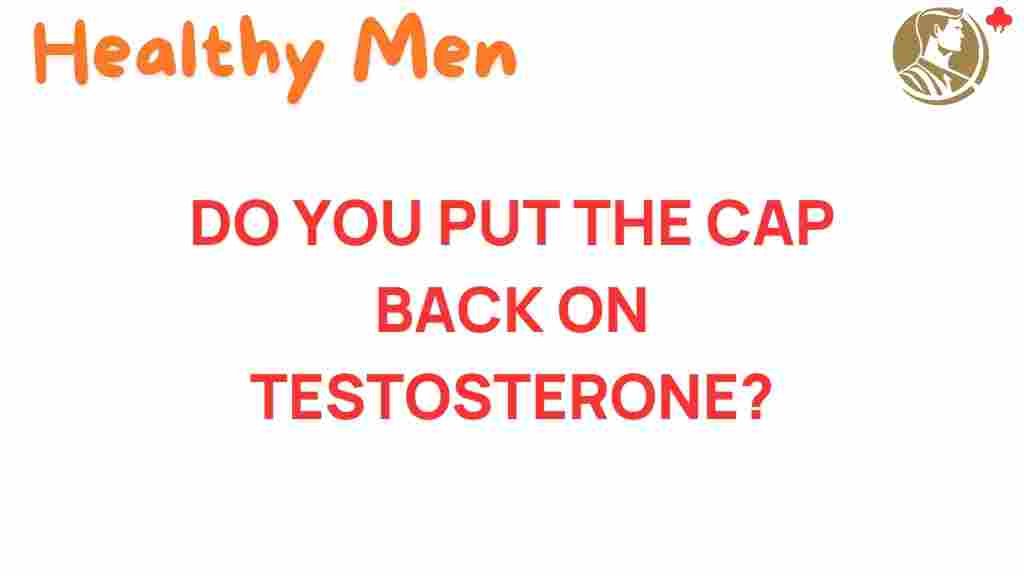Uncapping Testosterone: The Surprising Truth About Hormone Health
Testosterone is often viewed through a narrow lens, primarily associated with masculinity and physical strength. However, the importance of testosterone extends far beyond these stereotypes. Understanding testosterone and its role in hormone health is crucial for overall wellness, especially in men’s health and fitness. This article uncovers the surprising truths about testosterone, debunks common myths, and offers insights into optimal hormone balance through lifestyle choices and supplementation.
The Role of Testosterone in Men’s Health
Testosterone is a vital hormone that plays a significant role in various aspects of men’s health:
- Muscle Mass and Strength: Testosterone is essential for muscle growth and strength. Higher levels of testosterone can lead to increased muscle mass.
- Bone Density: This hormone is crucial for maintaining bone density, reducing the risk of osteoporosis as men age.
- Mood and Cognitive Function: Testosterone influences mood, energy levels, and cognitive functions. Low levels can contribute to issues like depression and fatigue.
- Sexual Health: Testosterone is key in regulating libido and erectile function, making it a cornerstone of sexual health.
Understanding the multifaceted role of testosterone can help men prioritize their hormone health and overall well-being.
Common Myths About Testosterone
Despite its importance, there are many myths surrounding testosterone. Let’s address some of the most prevalent misconceptions:
- Myth 1: Testosterone is Only for Bodybuilders: While it’s true that athletes may focus on testosterone for muscle growth, it is essential for all men, regardless of their fitness goals.
- Myth 2: Testosterone Levels Decline Only in Old Age: Testosterone levels can decline in men as early as their 30s, and various factors like stress, obesity, and lifestyle can accelerate this decline.
- Myth 3: More Testosterone is Always Better: Excess testosterone can lead to serious health issues, including heart problems and hormonal imbalances.
By debunking these myths, we can approach testosterone health with a clearer perspective.
Signs of Low Testosterone
Low testosterone can affect various aspects of life. Here are some signs to watch for:
- Decreased libido or sexual dysfunction
- Reduced energy levels and increased fatigue
- Loss of muscle mass and increased body fat
- Depression or mood swings
- Difficulty concentrating
If you experience any of these symptoms, it may be time to evaluate your hormone health.
Step-by-Step Process to Optimize Testosterone Levels
Optimizing testosterone levels involves a multi-faceted approach. Here’s a comprehensive guide:
1. Lifestyle Changes
Making informed lifestyle choices can significantly influence your testosterone levels:
- Exercise Regularly: Incorporate both strength training and cardiovascular exercises. Resistance training, in particular, has been shown to boost testosterone levels.
- Maintain a Healthy Weight: Obesity is linked to lower testosterone levels. Aim for a balanced diet that supports healthy weight management.
- Get Quality Sleep: Aim for 7-9 hours of quality sleep per night. Sleep deprivation can negatively impact testosterone production.
- Manage Stress: Chronic stress elevates cortisol levels, which can inhibit testosterone production. Practice stress management techniques such as meditation or yoga.
2. Nutrition for Hormone Health
The foods you eat can also affect your testosterone levels:
- Consume Healthy Fats: Incorporate sources of healthy fats, such as avocados, nuts, and olive oil, which are essential for hormone production.
- Ensure Adequate Protein Intake: Protein supports muscle health and can help maintain healthy testosterone levels. Include lean meats, fish, and plant-based protein sources.
- Include Zinc and Vitamin D: Both nutrients are crucial for testosterone production. Foods like shellfish, pumpkin seeds, and fortified cereals can help.
3. Supplementation
While it’s best to obtain nutrients from food, certain supplements can support hormone health:
- Zinc: Helps in testosterone production and can be beneficial if you have a deficiency.
- Vitamin D: Often linked to testosterone levels; consider a supplement if you have low levels.
- Fenugreek: Some studies suggest that fenugreek may help boost testosterone levels and improve sexual function.
Always consult with a healthcare provider before starting any supplementation regimen to ensure safety and efficacy.
4. Regular Health Check-ups
Regular check-ups with your healthcare provider can help monitor your hormone health:
- Blood Tests: Regular blood tests can help assess your testosterone levels and other hormone levels.
- Screening for Underlying Conditions: Conditions such as diabetes, thyroid issues, and sleep apnea can impact testosterone levels and overall health.
Troubleshooting Tips for Hormone Balance
Sometimes, despite your best efforts, testosterone levels may not improve. Here are some troubleshooting tips:
- Reevaluate Your Diet: Ensure you’re getting enough healthy fats, proteins, and micronutrients.
- Check Your Sleep Hygiene: Make changes to your sleep environment to improve sleep quality.
- Consider Professional Help: If you continue to struggle with low testosterone symptoms, consider consulting an endocrinologist or a hormone specialist.
Balancing hormones is not a one-size-fits-all approach, and sometimes professional guidance is necessary.
The Importance of Mental Health
Don’t overlook the connection between mental health and testosterone. Psychological well-being can influence hormone levels:
- Seek Support: If you’re experiencing depression or anxiety, consider talking to a mental health professional.
- Practice Mindfulness: Mindfulness techniques can reduce stress and improve overall mental health, potentially benefiting hormone balance.
Conclusion
Understanding testosterone and its impact on hormone health is essential for men’s wellness and fitness. Through lifestyle changes, proper nutrition, supplementation, and regular health check-ups, you can optimize your testosterone levels and overall health. Remember, the journey to hormone balance is a personal one; what works for one may not work for another. Stay informed, debunk the myths, and take charge of your health!
For more information on hormone health, feel free to visit this resource or explore other articles on our site to enhance your understanding of wellness.
Incorporating these strategies can lead to a healthier, more balanced life. Start today, and take the first steps toward better testosterone and hormone health!
This article is in the category Lifestyle and created by healthymen Team
